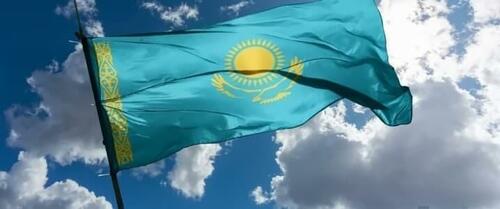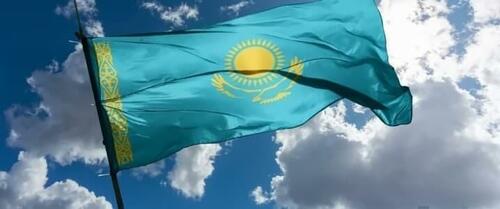Kazakhstan Walks Diplomatic Tightrope Amidst Azerbaijan-Russia Jet Crash Dispute
Via Eurasianet.org
-
Russia’s accidental shoot-down of an Azerbaijani civilian airliner has caused tension between the two countries.
-
Kazakhstan is overseeing the crash investigation and is trying to remain neutral despite pressure from both sides.
-
The incident highlights Kazakhstan’s delicate balancing act as it tries to maintain good relations with both Russia and Azerbaijan, both key economic partners.
Kazakhstan is treading delicately as it strives to keep two feuding neighbors happy amid a row over Russia’s accidental shoot-down of an Azerbaijani civilian airliner, which crashed outside the Kazakh city of Aktau. Kazakh officials have little to gain and a lot to lose as they oversee the crash investigation.
Relations between Azerbaijan and Russia remain fraught as Azerbaijani officials await the results of the official crash investigation. Kazakhstan’s vice minister of transportation, Talgat Lastayev, announced December 30 that preliminary findings are expected to be released in late January.
Azerbaijani-Russian tension revolves around the Kremlin’s reluctance to admit Russian air defenses brought the plane down on December 25, killing 38 of the 67 individuals on board. Kazakhstan got caught in the middle because the stricken jet, which had been bound for Grozny in the Russian region of Chechnya, crossed the Caspian Sea to make a crash landing in Aktau. That fact thrust Kazakhstan into a key role in an investigation in which the principal actors – Azerbaijan and Russia – have starkly differing agendas.
In the face of Russian silence over culpability for the crash, Azerbaijani leader Ilham Aliyev has pressed for a transparent probe. At the same time, he has accused Kremlin of trying to cover up its responsibility for the tragedy, pointing out that Russian officials initially offered several “absurd” alternate theories before evidence of the shoot-down came to light. Government-friendly news outlets in Baku even accused Russia of prompting the jet to attempt a landing in Aktau in the hope that it would crash into the Caspian, thus erasing all evidence of Russian involvement. Russia’s approach so far suggests the Kremlin is far from eager to see all the facts come out.
Ultimately, some of the 29 survivors have provided testimony substantiating a shoot-down, and the intact rear section of the plane shows signs of being hit by anti-aircraft flak. The black boxes have been recovered and sent to Brazil for analysis.
Despite their country’s central position in the investigation, Kazakh officials have tried to remain aloof from the festering controversy. In the first hours after the crash, Kazakh officials appeared to amplify alternative theories pushed by Russia to explain the tragedy, including the since discredited claim that an oxygen tank inside the aircraft exploded. Kazakh officials also initially backed a Russian proposal that a CIS commission handle the investigation, which would have given Moscow expanded influence over the probe’s scope and final report.
As evidence of a shoot-down, including survivor accounts, continued to mount, Kazakhstan has adopted a decidedly neutral tone. During the last days of December, Kazakh President Kassym-Jomart Tokayev has had telephone conversations with both his Azerbaijani and Russian counterparts, Aliyev and Vladimir Putin, according to the presidential press service, which was notably silent on the substance of those discussions.
State-controlled media in Kazakhstan has largely refrained from reporting on what caused the crash. The leitmotif of official publications is that Kazakhstan is making every effort to find out what really happened. In recent days, Kazakh officials have been scrupulous in saying their actions are guided by international guidelines. For example, Transport Minister Marat Karabayev cited the International Civil Aviation Organization’s Chicago Convention in explaining why the crashed jet’s black boxes were sent to Brazil, action that seemed sure to rankle Russia, given the Kremlin’s apparent desire to suppress evidence of a shoot-down.
“Kazakhstan stands for objectivity in investigation of air disaster,” stated a December 30 commentary published by the government newspaper Kazakhstanskaya Pravda, quoting a Kazakh political scientist, Eduard Poletaev.
“The decision to send on-board recorders for decoding to Brazil is a manifestation of the independence, sovereignty and impartiality of Kazakhstan.”
Independent media outlets in Kazakhstan have covered the controversy over the crash’s cause. Accounts offered by Orda.kz, for example, have tended to highlight the assertions made by Aliyev and Western officials supporting the notion of Russian responsibility for the tragedy.
The reasons why Kazakh leaders are eager to avoid angering either Azerbaijan or Russia over their handling of the investigation are clear: both countries are key economic partners for Kazakhstan, and any hiccup in relations can have extensive financial repercussions for Astana.
One source of leverage for Russia is the pipeline that connects oil produced in Kazakhstan’s Tengiz oil field to export markets via a pipeline and oil terminal at the Russian port of Novorossiysk under the auspices of the Caspian Pipeline Consortium. The pipeline handles about 80 percent of Tengiz oil exports.
Russia, as a means of either influencing Kazakh decision-making or expressing its displeasure with Astana’s actions, could disrupt pipeline operations. “Moscow can stop the transportation of Kazakh oil to Europe under some pretext such as the repair of the CPC infrastructure, as they did during the summer of 2022,” Talgat Ismagambetov, a political scientist at the Almaty Institute of Philosophy, Politics and Religion, said in an interview. In such an instance, “Kazakhstan could suffer big losses again, and this would be a warning [or] punishment from Russia.”
At this point, Kazakhstan may have even more to lose by alienating Azerbaijan. The two countries are key transit nodes for East-West trade via the Middle Corridor route. In addition, Azerbaijan and Kazakhstan are partners in a developing consortium to ship solar- and wind-generated power to Western markets.
“For Astana, Baku is a very important partner, and in the future, an even more important partner, especially in terms of the joint development of the Trans-Caspian route,” Ismagambetov said.
While Russia maintains its silence about the investigation, Aliyev has voiced approval of Kazakhstan’s actions so far, describing the Kazakh emergency response to the crash and outpouring of public sympathy for the victims as “what true friendship and brotherhood look like.”
Tokayev’s diplomatic background has proven beneficial in helping Kazakhstan negotiate a tricky situation so far, according to Ismagambetov. “Tokaev has acted subtly because he is a professional diplomat and this is his instinct,” he said.
Tyler Durden
Sun, 01/05/2025 – 08:10


